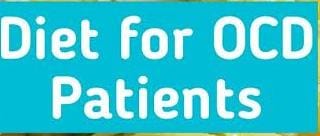Obsessive-Compulsive Disorder (OCD) is a mental health condition that affects thoughts and behaviors, causing unwanted repetitive actions. While therapy and medication play an important role in managing OCD, diet also plays a crucial part in supporting brain health and reducing symptoms. A well-balanced diet can help improve mood, reduce anxiety, and support overall mental well-being. This guide provides a detailed diet plan to help manage OCD naturally.
The Role of Diet in OCD

The brain needs proper nutrition to function well. Nutrients such as omega-3 fatty acids, vitamins, and minerals help in neurotransmitter balance, which plays a key role in OCD symptoms. A good diet plan can:
Reduce stress and anxiety
Improve brain function
Support serotonin and dopamine production
Provide essential nutrients for overall mental health
Best Foods for OCD

- Omega-3 Fatty Acids
Omega-3s support brain function and help reduce anxiety and inflammation.
Fatty fish (salmon, mackerel, sardines)
Flaxseeds and chia seeds
Walnuts
Omega-3 fortified eggs
- Protein-Rich Foods
Protein contains amino acids that help in the production of neurotransmitters like serotonin and dopamine.
Lean meats (chicken, turkey)
Eggs
Lentils and beans
Tofu and tempeh
Greek yogurt
- Complex Carbohydrates
Complex carbs help maintain stable blood sugar levels and increase serotonin, a mood-enhancing hormone.
Whole grains (brown rice, quinoa, oats)
Sweet potatoes
Legumes
Fruits like bananas and apples
- Magnesium-Rich Foods
Magnesium helps in relaxation and reduces stress, which is beneficial for OCD symptoms.
Leafy greens (spinach, kale)
Nuts and seeds (almonds, sunflower seeds)
Avocados
Dark chocolate (in moderation)
- Probiotics and Prebiotics
Gut health is linked to mental health. Probiotics help maintain a healthy gut-brain connection.
Yogurt (with live cultures)
Kimchi and sauerkraut
Kefir
Fiber-rich foods (onions, garlic, asparagus)
- Vitamin D
Low levels of Vitamin D are associated with mood disorders. Sun exposure and food sources help in maintaining optimal levels.
Fatty fish
Fortified dairy products
Mushrooms
Egg yolks
- Antioxidant-Rich Foods
Antioxidants protect brain cells from oxidative stress.
Berries (blueberries, strawberries)
Green tea
Dark leafy greens
Turmeric (curcumin)
- Hydration
Dehydration can increase anxiety and stress.
Drink at least 8 glasses of water daily
Herbal teas (chamomile, peppermint, green tea)
Coconut water for electrolytes
Foods to Avoid
Certain foods can trigger or worsen OCD symptoms.
Processed Foods: High in additives and unhealthy fats
Caffeine: Can increase anxiety and restlessness
Sugar: Causes blood sugar spikes, leading to mood swings
Alcohol: Interferes with brain function and serotonin levels
Artificial Sweeteners: May disrupt neurotransmitter balance
Sample 7-Day Diet Plan for OCD
Day 1
Breakfast: Scrambled eggs with spinach and whole grain toast
Snack: Greek yogurt with berries
Lunch: Grilled salmon with quinoa and steamed broccoli
Snack: Handful of walnuts
Dinner: Lentil soup with mixed greens salad
Drink: Chamomile tea before bed
Day 2
Breakfast: Oatmeal with flaxseeds and banana
Snack: Handful of almonds
Lunch: Grilled chicken with sweet potato and sautéed kale
Snack: Dark chocolate (small piece) with green tea
Dinner: Tofu stir-fry with brown rice
Day 3
Breakfast: Smoothie (banana, spinach, flaxseeds, almond milk)
Snack: Boiled eggs
Lunch: Chickpea salad with olive oil dressing
Snack: Pumpkin seeds
Dinner: Grilled fish with roasted vegetables
Day 4
Breakfast: Whole grain toast with avocado
Snack: Cottage cheese with sunflower seeds
Lunch: Lentil soup with whole grain bread
Snack: Fresh fruit (apple or pear)
Dinner: Chicken with quinoa and steamed broccoli
Day 5
Breakfast: Scrambled eggs with mushrooms
Snack: Yogurt with honey and nuts
Lunch: Grilled tofu with brown rice and stir-fried vegetables
Snack: Dark chocolate and green tea
Dinner: Baked salmon with roasted sweet potatoes
Day 6
Breakfast: Oatmeal with chia seeds and berries
Snack: Handful of cashews
Lunch: Quinoa salad with chickpeas and feta cheese
Snack: Carrot sticks with hummus
Dinner: Grilled chicken with mashed sweet potatoes
Day 7
Breakfast: Smoothie (banana, oats, Greek yogurt, walnuts)
Snack: Boiled eggs with a sprinkle of salt
Lunch: Lentil soup with a mixed greens salad
Snack: Dark chocolate and almonds
Dinner: Stir-fried tofu with brown rice and vegetables
Additional Tips
- Eat Regular Meals: Skipping meals can cause blood sugar fluctuations, leading to mood swings.
- Practice Mindful Eating: Avoid distractions while eating, chew food properly, and enjoy every bite.
- Exercise Regularly: Physical activity helps balance mood and improve overall well-being.
- Get Enough Sleep: Poor sleep can worsen OCD symptoms.
- Manage Stress: Meditation, deep breathing, and yoga can help reduce anxiety.
- Consult a Professional: A nutritionist or healthcare provider can create a personalized plan based on individual needs.
Conclusion
A balanced diet rich in omega-3s, vitamins, minerals, and antioxidants can help manage OCD symptoms effectively. Avoiding processed foods, sugar, caffeine, and alcohol is equally important. By following a nutrient-dense meal plan and adopting healthy lifestyle habits, individuals with OCD can improve their mental well-being and overall quality of life.



